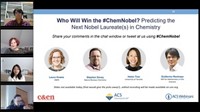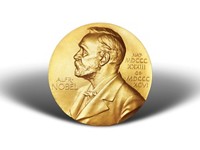Advertisement
Grab your lab coat. Let's get started
Welcome!
Welcome!
Create an account below to get 6 C&EN articles per month, receive newsletters and more - all free.
It seems this is your first time logging in online. Please enter the following information to continue.
As an ACS member you automatically get access to this site. All we need is few more details to create your reading experience.
Not you? Sign in with a different account.
Not you? Sign in with a different account.
ERROR 1
ERROR 1
ERROR 2
ERROR 2
ERROR 2
ERROR 2
ERROR 2
Password and Confirm password must match.
If you have an ACS member number, please enter it here so we can link this account to your membership. (optional)
ERROR 2
ACS values your privacy. By submitting your information, you are gaining access to C&EN and subscribing to our weekly newsletter. We use the information you provide to make your reading experience better, and we will never sell your data to third party members.
Awards
Editorial: Nobel week is fast approaching. Who are the front-runners?
by Bibiana Campos Seijo
September 17, 2022
| A version of this story appeared in
Volume 100, Issue 33
If you have been to any mall or reasonably large supermarket in the US in the past few weeks, you’ll have seen that there are already Halloween-related goods on sale. After Halloween, the merchandise will be replaced by Thanksgiving-themed products, quickly followed by Christmas items. Come January, it’ll be red hearts everywhere to celebrate Valentine’s Day, with products for Easter and Mother’s Day following in quick succession. The phenomenon of holiday merchandise hitting shelves well before the actual holiday has a name. It is called seasonal or holiday creep, and it is designed by corporations to lengthen the selling time for seasonal products and maximize profit.
As October is fast approaching, I was wondering if we in the sciences have inadvertently created something akin to holiday creep for the Nobel Prizes—that is, a Nobel creep. Although there are multiple significant science awards throughout the year, most don’t get as much attention as the Nobel Prizes. But has the Nobel season expanded beyond what it used to be? Are the prediction stories starting earlier and the follow-up news going on for longer than in times past? I do not have hard data to base this idea on, but it feels that, at least at C&EN, we start to prepare and plan our coverage earlier every year.
Creep or no creep, we’ll be covering the Nobel Prize in Physiology or Medicine on Oct. 3, the Nobel Prize in Physics on Oct. 4, and the Nobel Prize in Chemistry on Oct. 5. In addition to covering the prizes, we’ll also be publishing a podcast with first impressions and analysis of the chemistry prize.
But who will win the chemistry prize? I have my money on Stanford University’s Carolyn Bertozzi. She received the Wolf Prize in Chemistry in February, followed by the Robert A. Welch Award in Chemistry in August. Could a hat trick be in the cards for her? Some say that the Wolf Prize is a good predictor—a stepping stone of sorts—for the Nobels. In fact, according to the Jerusalem Post, 30% of Wolf Prize recipients have gone on to receive a Nobel.
Bertozzi’s area of research, bioorganic chemistry, could have significant ramifications for the development of future diagnostics and therapies, especially for cancer, inflammation, and bacterial infection. She is hailed as the founder of the field of bioorthogonal chemistry, which refers to any chemical reaction that can be conducted within living cells while avoiding interference with the cells’ native biochemistry. And she is also a serial entrepreneur who has launched multiple start-ups to commercialize the technologies she has developed.
My track record when it comes to forecasting the chemistry Nobel Prize winner is not too bad. In 2016, I speculated that Ben Feringa and molecular machines would get it, which they ultimately did, but then I talked myself out of it.
In 2019, I correctly predicted that it was Goodenough’s time to be recognized for his discovery of lithium-ion batteries. I also speculated that CRISPR would receive the prize at some point but also correctly acknowledged that it was too early for Jennifer Doudna and Emmanuelle Charpentier to earn the recognition because of ongoing patent litigation at the time. Only 12 months later, they won the award.
If you’d like to share your prediction, please write to us at edit.cen@acs.org and let us know. Whether or not you have a prediction, please join us for our now-traditional Nobel prediction webinar, on Thursday, Sept. 29, 2:00–3:00 p.m. (EDT). Senior Editor Laura Howes will be joined by Stephen Davey, the chief editor of Nature Reviews Chemistry; Helen Tran, an assistant professor in the Department of Chemistry at the University of Toronto; and Guillermo Restrepo, a researcher at the Max Planck Institute for Mathematics in the Sciences, who will go over the front-runners for this year’s prize and which big ideas in chemistry they think should one day be recognized with a Nobel Prize. Register at cenm.ag/2022nobelpredictions.
Views expressed on this page are those of the author and not necessarily those of ACS.




Join the conversation
Contact the reporter
Submit a Letter to the Editor for publication
Engage with us on Twitter